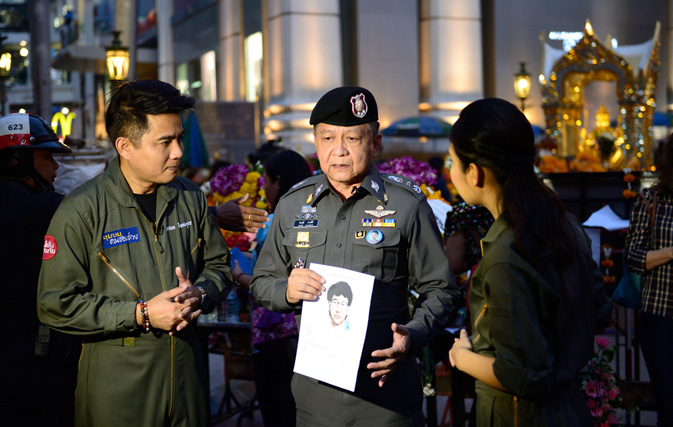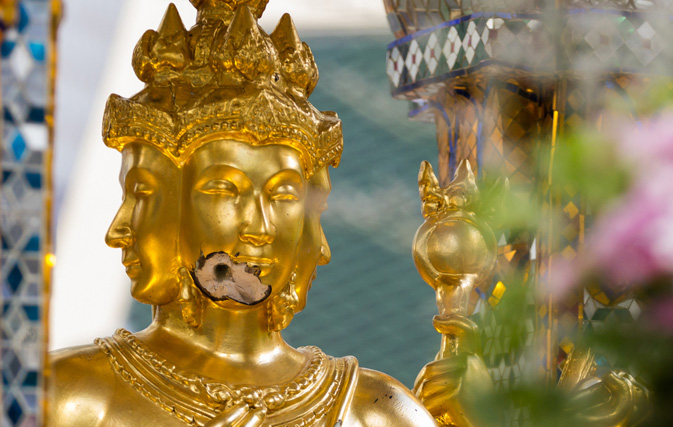BANGKOK — Thai authorities unveiled the restored centerpiece Friday of the Erawan Shrine, in the latest bid to boost confidence among Bangkok’s tourism and business communities almost three weeks after a deadly bombing that left 20 dead.
In the past week, police have arrested two people and identified seven more believed to be part of a network that carried out the Aug. 17 blast, which also injured more than 120 people. They have intentionally avoided calling it an act of terrorism for fear of hurting Thailand’s image.
“The most important issue for the country’s image is to restore confidence about safety,” Minister of Culture Vira Rojpojchanarat told reporters at Friday’s ceremony. He said it was intended to “create confidence and raise the morale of (Thai) people and tourists.”
The ministry’s Fine Arts Department repaired 12 areas of the shrine’s gleaming golden statue of the Hindu god Brahma that were damaged by the attack, notably on its four-headed face where a chin was blasted out, Vira said.
“Every day the police and national security are making progress on the case,” Vira added.
In the past week, the investigation picked up pace with police arresting the two suspects and carrying out two raids on homes in Bangkok where bomb-making materials were discovered.
At a third raid on Thursday, authorities found “suspicious fluid in a barrel” that was being analyzed by explosives experts, said national police spokesman Prawut Thavornsiri. But initial tests showed that the fluid “cannot be used as explosive components,” military spokesman Winthai Suvaree said Friday.
Thai authorities have suggested that at least two of the nine suspects are possibly Turkish, prompting the Turkish Embassy in Bangkok to issue a statement Thursday saying it has not received confirmation from Thai authorities about the suspects’ nationalities.
The Turkish connection has boosted a theory that the suspects may be part of a group seeking to avenge Thailand’s forced repatriation of more than 100 ethnic Uighurs to China in July. Thailand is believed to be a transit stop for Chinese Uighurs attempting to go to Turkey.
Uighurs (pronounced WEE-gurs) are related to Turks, and Turkey is home to a large Uighur community. The Erawan Shrine is especially popular with Chinese tourists, feeding the speculation that it could have been targeted by people who believe the Uighurs are oppressed by China’s government.
China has alleged that the repatriated Uighurs included some who intended to join Islamic State fighters in Syria.
In another finding that could support a link to Uighurs, police said that a man arrested Tuesday who is considered a main suspect in the bombing was carrying a Chinese passport. The passport indicated he was from the western Chinese region of Xinjiang, but Thai authorities had not yet verified its authenticity, Prawut said. Xinjiang is the home of the Turkish-speaking Uighurs.
Authorities on Thursday identified the suspect but issued two different spellings of his name — Mieraili Yusufu and Yusufu Meerailee — and said he faces charges of possessing unauthorized explosives. Police said they found his fingerprints on a bottle of bomb-making material recovered from an apartment that was raided over the weekend.
The other suspects include a Thai woman identified as Wanna Suansan and said to be married to a Turkish man. Both are being sought by Thai police.
The home police raided Thursday was leased by Wanna, the police spokesman said. The home is in the outer Bangkok neighbourhood of Min Buri near another apartment also leased by Wanna where police found gunpowder, fertilizer and other bomb-making materials in a raid over the weekend.
In interviews with Thai media, Wanna said she is innocent and is currently living in Turkey.
Thai authorities have been careful not to state publicly that the case may be linked to the Uighurs. They have said that such speculation could affect international relations and hurt tourism.
“We have agreed already that I won’t mention the name of a country, the name of a group or their religion. Please allow me to say that it is a network, and let’s wait and see which group it is,” Prawut said Thursday when asked if the case was linked to Uighurs.
Thai security officials have suggested the suspects are part of a human trafficking ring with a grudge against Thailand. However, Thai Prime Minister Prayuth Chan-ocha, known for his outspokenness, has stretched the theory to acknowledge it could have been a gang involved in smuggling Uighurs out of China.
The embassy statement highlighted the confusion surrounding the ongoing investigation, in which police say they seized more than 200 fake Turkish passports.
“There is no clear information on the issue,” the spokesman was quoted as saying, urging Thai authorities to “provide clear and correct information.”

The Latest on Bangkok: Police say suspect unlikely to be shrine bomber, but is a conspirator
BANGKOK — Thai police say a man arrested at the border near Cambodia is unlikely to be the yellow-shirted bomber of a Bangkok shrine.
The police announcement means the bomber is still at large.
National police spokesman Prawut Thavornsiri says the DNA taken from the suspect did not match the DNA found on evidence that the bomber is believed to have left behind in a taxi and a motorcycle taxi he took after planting the device at the Erawan shrine on Aug. 17 that killed 20 people and wounded more than 120.
However, the suspect is definitely involved with the bombing, Prawut told reporters Friday.
He said his DNA was found in the two apartments on the outskirts of Bangkok that were raided by police, and where bomb-making materials were found.
The suspect — identified as Mieraili Yusufu and Yusufu Meerailee — faces charges of possessing unauthorized explosives.

